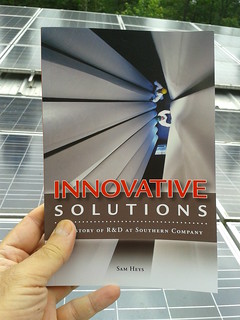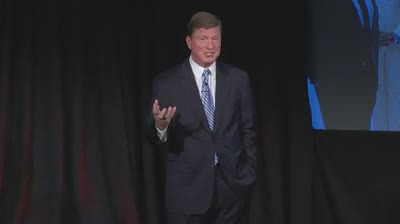The biggest wind problem in Germany is it produces too much power? Fortunately there are two well-known simple solutions to this problem raised by GA Public Service Commissioner Tim Echols in a comment yesterday. I do want to thank him for engaging in dialog with the public.
Tim Echols wrote:
We need nuclear, coal and gas as our baseload power. Germany is doing the opposite and they are in trouble. Their people pay triple what we pay for power, and when the wind is blowing at night or on the weekend, the Germans have to pay Poland to take their excess power. All of that primarily because the German people hate nuclear power. In Georgia, we are leading the nation, and I am fine with that. I just want to make sure our ratepayers are protected and not paying for the learning curve of new nuclear.
As FERC Chairman Jon Wellinghof has been pointing out for years, baseload is the problem. The baseload ideology stands in the way of the distributed solar power the vast majority of the American people want, and in the way of wind power.
Regarding German power costs to customers, Germany is far north of here, with far less sun, and Germany has depended heavily on Feed-In Tariffs, which may or may not be what we need in Georgia. Meanwhile, what’s been hiking power rates in Georgia is not solar or wind power, it’s nuclear and natural gas. And not for Feed-In Tariffs, either, which are only charged on actual energy production. The Georgia legislature approved Construction Work in Progress (CWIP) for nuclear, and GA PSC has raised rates to pay for natural gas plant construction, which amounts to the same thing. If we want to save ratepayers money, we should get on with solar and wind power.
Now to the problem with two well-known solutions:
…when the wind is blowing at night or on the weekend, the Germans have to pay Poland to take their excess power.
Here’s an article about the Czechs considering installing phase-shifters to push German power on to Poland. Jan Lopatka wrote for Reuters 17 April 2013, Czech grid acts to guard against German wind power surges,

He [Chairman Tomas Huener of the Czech grid operator CEPS] said Germany could solve the problem by allowing its grid operators to turn off renewable sources at times of excess production, which is not currently possible under German law.
The German cabinet agreed a plan late last year which could also help, aiming to speed up the construction of 2,800 km of power lines to improve the grid between the northern coast, where many of the wind turbines are, and the country’s industrialised south. (Editing by Michael Kahn and Jason Neely)
There are the two well-known solutions:
-
Don’t legally prohibit feathering windmills when they’re
producing more power than needed.
Georgia has a chance to learn from Germany’s experience.
However, there is a problem with this solution.
Who decides what’s more than needed?
Would that be Georgia Power, and would “more than needed”
mean “we might have to turn down some of our nuclear or natural gas
or coal plants”?
If so, that’s a bad solution.
-
 So the second solution is preferable:
get on with a smart grid.
Southern Company brags about having the biggest private R&D operation
in the country.
By “brags” I mean not only has SO CEO Tom Fanning mentioned it repeatedly,
and SO had a presentation about it at their Stockholder Meeting in May,
but they also wrote a book about it,
Innovative Solutions: A History of R&D at Southern Company, by Sam Heys,
2013; the copy pictured on the right with my solar panels I got signed
by the author at that meeting.
At that same meeting, Tom Fanning announced
a tiger team
with
So the second solution is preferable:
get on with a smart grid.
Southern Company brags about having the biggest private R&D operation
in the country.
By “brags” I mean not only has SO CEO Tom Fanning mentioned it repeatedly,
and SO had a presentation about it at their Stockholder Meeting in May,
but they also wrote a book about it,
Innovative Solutions: A History of R&D at Southern Company, by Sam Heys,
2013; the copy pictured on the right with my solar panels I got signed
by the author at that meeting.
At that same meeting, Tom Fanning announced
a tiger team
with
Tom Fanning promised a report from the tiger team “later this summer”.
…a number of people working across the system — representation on every system company — to develop a business model where Southern Company can now promote, play offense, on distributed generation.
 It was really refreshing to see SO working on distributed
generation, since
I’ve been calling for an energy reliability study for Georgia
for at least two years now.
I would bet SO will find that they don’t even have to build a lot
of new power lines, since they already have most of those in place,
for example to distribute from Plant McIntosh near Savannah.
Even if Georgia Power does have to build more lines,
that’s far cheaper than building a nuclear plant.
It was really refreshing to see SO working on distributed
generation, since
I’ve been calling for an energy reliability study for Georgia
for at least two years now.
I would bet SO will find that they don’t even have to build a lot
of new power lines, since they already have most of those in place,
for example to distribute from Plant McIntosh near Savannah.
Even if Georgia Power does have to build more lines,
that’s far cheaper than building a nuclear plant.
 And, unlike
that natural gas pipeline from Alabama to Florida
for no benefit to Georgians that GA PSC has apparently permitted,
I’d bet Georgia Power could use existing transmission line rights of way.
Let’s see
a real renewable energy study for Georgia so we can find out.
And, unlike
that natural gas pipeline from Alabama to Florida
for no benefit to Georgians that GA PSC has apparently permitted,
I’d bet Georgia Power could use existing transmission line rights of way.
Let’s see
a real renewable energy study for Georgia so we can find out.
 And such a study may well find what
the late John Blackburn already
discovered for North Carolina:
wind and solar can power the whole state, with only much less
natural gas than now needed for backup, and no coal or nuclear at all.
And such a study may well find what
the late John Blackburn already
discovered for North Carolina:
wind and solar can power the whole state, with only much less
natural gas than now needed for backup, and no coal or nuclear at all.
Continuing to build more baseload power plants while shirking solar and wind generation is not leading Georgia into the future, it’s leading us into the past, like building a stand-alone copper telephone network in this age of the mobile wireless Internet.
 How about instead of another rate hike for
those infrastructure investments Georgia Power says it needs,
GA PSC this time can say stop wasting more of our money on
that nuke boondoggle at Plant Vogtle?
That’s what Ray Henry of AP said Tim Echols was suggesting Monday:
cap Plant Vogtle cost overruns like the Mississippi PSC did with Kemper Coal.
How about instead of another rate hike for
those infrastructure investments Georgia Power says it needs,
GA PSC this time can say stop wasting more of our money on
that nuke boondoggle at Plant Vogtle?
That’s what Ray Henry of AP said Tim Echols was suggesting Monday:
cap Plant Vogtle cost overruns like the Mississippi PSC did with Kemper Coal.
And thanks once again to Tim Echols for engaging in dialog.
-jsq
Short Link: